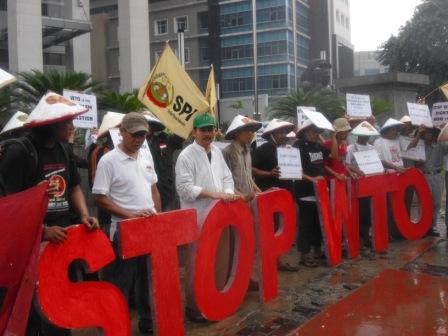Press release – CAIRNS Group Meeting in Bali 2-9 June 2009
{multithumb}
The country members of the CAIRNS Group that gathers the 17 main agricultural exporters in the world are gathering in Bali on 7-9 June 2009. The event is hosted by the Indonesian Trade Minister even though Indonesia is in a very ambiguous situation: the country is still a member of the exporters club even though its trade balance has been negative in the last decade. Moreover, the Indonesian Trade Minister is the Chair of the “G33” in the WTO negotiations, an other group asking for Special Product and Special Safeguard Mechanism (SP/SSM) against free imports.
The Bali meeting has been given a high profile because the CAIRNS Group has invited the key players in the WTO negotiations such as the Director General Pascal Lamy, the Trade Ministers of India and China as well as the United States Trade Representative (USTR). Their participation shows their willingness to revive the WTO talks that have been agonising for years due to some disagreements, mainly on agriculture.
For the international peasant’s movement La Via Campesina, reviving the WTO negotiations is a nonsense.
-
The food crisis that escalated in 2008 did not happen because of lack of food production but mainly because of speculative moves by big players on the world food market. Investors have entered the food and agricultural markets, making profit while while ordinary people and small farmers where suffering from the sky-rocketing food prices. This crisis is a consequence of the liberalization of the world food and agricultural markets. Trying to revive the WTO talks in a country where millions of people have been affected by the food crisis is a shocking initiative.
-
The monopolisation of the food and agricultural production in the hand of very few agribusiness corporations is a characteristic of the CAIRNS group countries. Monopolies will never feel the world. In the contrary, they grab the livelihood of hundred of millions of small farmers everywhere. Indonesia for instance has become the largest palm oil exporter in the world, but ordinary people are not able to afford edible oil because of the agribusiness control over oil production and trade. Even worse is the rampant expansion of the agribusiness corporations who are grabbing large extension of agricultural land, kicking out millions of small farmers out of their land.
-
The monoculture production developed in the CAIRNS groups countries is a serious threat to rural communities and the environment. Monoculture plantations also threaten the climate as they incrase carbon emissions due to land conversions and intensive fuel energy use (for transportation, chemical pesticides…). At the same time monocultures are decreasing the carbon sequestration by destroying soils.
It is clear that the time has come for a shift towards sustainable agriculture, and not an increase of monocultures.
-
During the current presidential election campaign in Indonesia all the candidates are claiming to oppose neoliberal policies. It is quite contradictory that the country is now hosting an event that promotes the liberalisation of agricultural trade, one of the main tenets of neoliberalism. Indonesian leaders should be consistent and turn the page of neoliberalism to open the new page of the people economy.
-
One of the concrete mesures that should be taken to solve the current multi-dimensional crisis (the financial, food, climate and biodiverity crises) would be to immediately close the WTO secretariat and stop the negotiations. Ordinary people and small farmers – women and men – need real solutions. They would never understand why the world continues in a direction that has led to the major crises that the world is now facing.
-
People around the world are already implementing policies and practices radically different from the neoliberal dogma. Implementing food sovereignty, developing local food markets and giving land to peasants to allow them to produce food for all in a sustainable way are among the solutions to the food, the financial and the climate crises.
For interviews in Indonesia:
Henry Saragih – General Coordinator of Via Campesina and Secretary General of the Indonesian Peasant’s Union – SPI : + 62 8163144441 (mobile phone)
